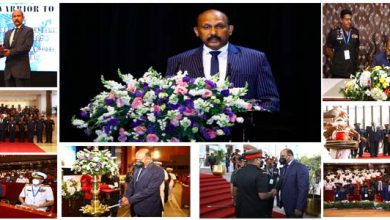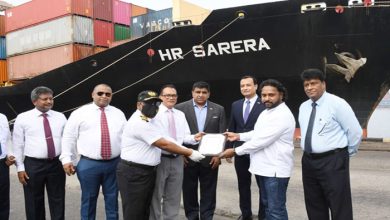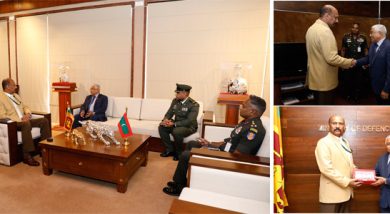National Consultations for the Stockholm +50 Conference kickstarts in Colombo
Towards a sustainable and greener future for people and planet

As one of 36 biodiversity hotspots, Sri Lanka has one of the highest rates of biological endemism in the world. In response to climate change with ambitious Nationally Determined Contributions (NDCs), Sri Lanka hopes to achieve carbon neutrality by 2050 and avoid capacity addition of coal power plants.
50 years since the inaugural United Nations Conference on the Human Environment held in Stockholm, Sweden, we face a triple planetary crisis of climate change, pollution and biodiversity loss, as well as other planetary ills exacerbated by economic uncertainties, that are affecting our current and future wellbeing.
‘Stockholm+50: a healthy planet for the prosperity of all – our responsibility, our opportunity’ is an international meeting co-hosted by the Government of Sweden and Kenya. It presents an opportunity for co-creation and a multistakeholder approach to accelerate implementation in the coming decade. This includes the relationship between humans and nature, what we invest in, and how resources are used and shared, all areas that are fundamental to a sustainable future.
To this end, the United Nations Development Programme in Sri Lanka and the Ministry of Environment have come together to host a series of national consultations and develop a Country Report in the lead up to the Stockhom+50 conference this year. The consultations aim to bring together a diverse array of stakeholders from across the country to ensure equal representation and expand stewardship in addressing the health of the environment.
Speaking at the state sector consultation this morning which launched the series of consultations, Dr. Anil Jasinghe, Secretary, Ministry of Environment noted, “today the buzz word is triple planetary crisis – climate change, biodiversity loss and pollution. These three together show the globe in dire conditions. Despite its low carbon footprint, Sri Lanka is on a low emissions path, and we look forward to achieving 14.5% reduction of greenhouse gases and increasing our forest cover by 32% by 2030. Pollution is the least attended area in Sri Lanka, however, we have now introduced sustainable nitrogen management as a part of our priorities. The voice of the environmental sector must come together for progressive-minded individuals to safeguard the interests of the environment. The efforts of the Ministry of Environment together with UNDP are timely in deciding our role at Stockholm +50. These consultations allow us to draft a country report with representation from all sectors in Sri Lanka.”
The consultations cover 3 themes, namely (i) the urgent need for a healthy planet and prosperity for all; (ii) sustainable and inclusive recovery from COVID-19; and (iii) the implementation of the environmental dimension of the SDGs. Engaging with a wide range of stakeholders from the state and private sector, civil society, academia, provincial councils, media and youth, among others; the consultations will gather input and experiences through in-person and virtual workshops, as well as online responses culminating in the drafting of Country Report ahead of the Stockholm+50 conference in June 2022.
Emphasizing on the importance of green development as we begin recovering from COVID-19, Ms. Malin Herwig, Deputy Resident Representative, UNDP Sri Lanka stated, “The journey since the initial Stockholm meeting fifty years ago has been strengthened by international dialogues and conferences through which global leaders have committed to protecting the Earth, culminating in the commitment to realizing the 2030 Agenda for Sustainable Development. UNDP in Sri Lanka, as the designated focal point, will conduct national consultations and support the development of the country report to feed into the global report which will inform proceedings at the Stockholm +50 Conference. We look forward to following up on the outcomes of the conference and supporting Sri Lanka on its green development trajectory.”
Sri Lanka has historically pursued ‘low-carbon’ development and has one of the lowest per capita energy intensity and emissions rates. For a sustainable future, immediate action for people, planet and prosperity is crucial to create a Sri Lanka that is built on a green development pathway.






